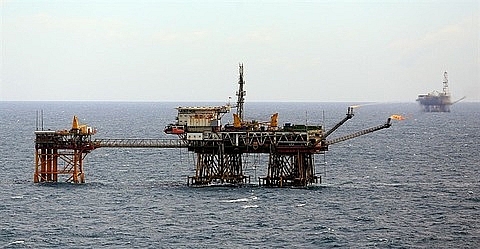PVN asks for revision of oil law
 |
| Oil rigs of Vietsovpetro, a joint venture between PetroVietnam and a Russian group, at Bach Ho oil field.-VNA/VNS Photo Huy Hung |
General Director of Vietnam Oil and Gas Group (PVN) Nguyen Vu Truong Son warned of this possibility at a seminar held by the National Assembly’s Economic Commission and PVN in Ha Noi on Monday, titled “Vietnam Petroleum Industry in the Fourth Industrial Revolution - Development and Integration”.
Son said PVN’s crude oil output was up to 25 million tonnes in 2017, but that exploration had only yielded new sites containing four million tonnes.
“The exploration activity in the first eight months of this year reached only two million tonnes because PVN does not have the resources to sustain such a high risk activity,” said Son.
“If the imbalance between exploration and exploitation continues to increase, the industry will only be able to sustain its petroleum output for a few more years before it will drop by roughly two thirds,” he said.
Meanwhile, Son said the current mechanism of attracting foreign investment in exploration activities was no longer effective.
PVN Chairman Tran Sy Thanh, who is also deputy chairman of the Central Party Committee’s Economic Commission, said no new projects were started by State economic groups in the past three years.
“The coal, oil and gas sectors did not start new projects in the last ten years. This means in the future, Viet Nam will have no new energy projects,” Thanh said. “At the moment, we are relying on what the previous generation did.”
Thanh said the Public Investment Law restricted the money available for exploration activities that would increase oil reserves.
“In fact, foreign investors have spent $45 billion on exploration but they have brought just $21 billion back to their countries,” said Thanh.
Son said in order to convince foreign investors to take a risk on exploration, the National Assembly (NA) should revise the Law on Petroleum. A new law should be passed that allows PVN to use 50 per cent of post-tax profits to continue operations and contribute to the State budget through exploration.
“The mechanism for attracting foreign investment must be revised to bring the production sharing contract (PSC) in line with Viet Nam’s priorities,” said Son.
Chairman of Viet Nam Petroleum Association Ngo Thuong San proposed modernising the 2008 petroleum law to stimulate foreign investment, get more out of mining sites and invest in the development of offshore oil fields.
While the industry waits on new permanent regulations, the Government and the Ministry of Industry and Trade (MoIT) are expected to release provisional regulations. These will focus on shortening the approval process for oil and gas fields to ensure that exploration keeps up with demand.
Procedures must be simplified, and incentives must be introduced to give foreign and domestic investors a reason to develop smaller fields. Progress could also be aided by investing in technology to increase oil output from each site.
Deputy Director of the MoIT’s Oil and Gas Department Tran Thanh Tung proposed a financial support mechanism for exploration, especially in deep water areas. This measure is designed to lure greater investment from domestic and foreign oil and gas corporations.
Speaking at the seminar, deputy head of NA Financial and Budgetary Committee Nguyen Huu Quang said exploration of oil and gas fields was a key national security issue, and would help secure Viet Nam’s sovereignty over the East Sea.
Quang said the exploration activities were a great financial risk, so PVN would be unable to pursue them without supportive regulations.
“If this problem is not resolved soon, it will affect national energy security,” he said.
Deputy Chairman of the NA Economic Committee Nguyen Duc Kien said because the oil industry was considered an important piece of the economy, there must be policies that help with its development.
Kien said the legal issue was proposed by PVN during its recent ownership change, which came at a time when oil prices were low and exploration activities were in decline.
After this talk, representatives of the NA Economic and Financial and Budgetary committees agreed to propose the Petroleum Law revision to the NA Standing Committee for consideration during its 2019-2020 period on the 14th.
What the stars mean:
★ Poor ★ ★ Promising ★★★ Good ★★★★ Very good ★★★★★ Exceptional
Related Contents
Latest News
More News
- MAE names big 10 policy wins in 2025 (February 06, 2026 | 08:00)
- US firms deepen energy engagement with Vietnam (February 05, 2026 | 17:23)
- Vietnam records solid FDI performance in January (February 05, 2026 | 17:11)
- Site clearance work launched for Dung Quat refinery upgrade (February 04, 2026 | 18:06)
- Masan High-Tech Materials reports profit: a view from Nui Phao mine (February 04, 2026 | 16:13)
- Hermes joins Long Thanh cargo terminal development (February 04, 2026 | 15:59)
- SCG enhances production and distribution in Vietnam (February 04, 2026 | 08:00)
- UNIVACCO strengthens Asia expansion with Vietnam facility (February 03, 2026 | 08:00)
- Cai Mep Ha Port project wins approval with $1.95bn investment (February 02, 2026 | 16:17)
- Repositioning Vietnam in Asia’s manufacturing race (February 02, 2026 | 16:00)

 Tag:
Tag:



















 Mobile Version
Mobile Version